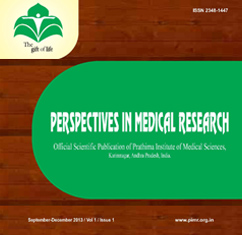
Original Articles
Year : 2018 | Volume : 6 | Issue : 3 Page : 45 - 48
Karunakar Ch1, Ravinder Reddy K2, Dilzith Arora K3, Spandana T4
1Assistant Professor,2Professor,4Postgraduate Student, Department of General Medicine, Prathima Institute of Medical Sciences, Karimnagar,Telangana.3Assistant Professor, Department of Social and Preventive Medicine, Prathima Institute of Medical Sciences, Karimnagar,Telangana,India.
Address for correspondence: Dr Karunakar Ch, Assistant Professor, Department of General Medicine, Prathima Institute of Medical Sciences, Karimnagar,Telangana,India.
Email: [email protected]
Introduction: Vitamin D deficiency is a pandemic, non communicable disease in India and worldwide. Vitamin D, which is technically a hormone rather than a fat soluble secosteroid responsible for increasing intestinal absorption of Calcium, Magnesium, Phosphate and multiple other biological effects. Researchers found that shift workers, indoor and healthcare workers are at an increased risk to develop Vit-D deficiency due to reduced outdoor time and sunlight exposure.
Aims and objectives: The rationale of this study was to find the Vit-D (1,25 OH2 Vit D) levels in apparently healthy medical students in Prathima Institute of Medical Sciences, Karimnagar.
Materials and Methods :The present study was done in General Medicine outpatient department, Vit-D levels were assessed in randomly selected 300 medical students with BMI of 18.5-24.9kg/m2, who had no past medical illness. 3ml of fasting venous sample from cubital vein was collected and analyzed for Vit-D levels by ADVIA �CENTAUR-XP automated analyzer by chemiluminescence immunoassay within 12 hrs.
Results :The total number of sample was 300 medical students, of which 160 were females and 140 were males. Among the girl students 77% (123) were Vit-D deficient and 21% (33) were having insufficiency. Among the Boys 66% (92) were deficient and 21% (30) were insufficient and 13% (18) were having normal Vit-D levels. Among the 300 medical students, 278 (92.7%) were having low vitamin D levels and only 22 (7.3%) were having normal Vitamin D levels.
Conclusion :A very high percentage of students were Vit-D deficient which correlates with higher incidence among health care workers. Limitations for the present study are it�s a cross sectional study than longitudinal study. No validated questionnaire was used, analysis method used was not gold standard, needs study in a larger population group. However it is a safer practice to supplement all the students with Vitamin D supplements.
Keywords : 1, 25 (OH)2 Vit-D levels, Medical students, chemiluminescence method.

Open Access
Perspectives in Medical Research is committed to keeping research articles Open Access.Journal permits any users to read, download, copy, print, search, or link to the full texts of these articles...
Read more
